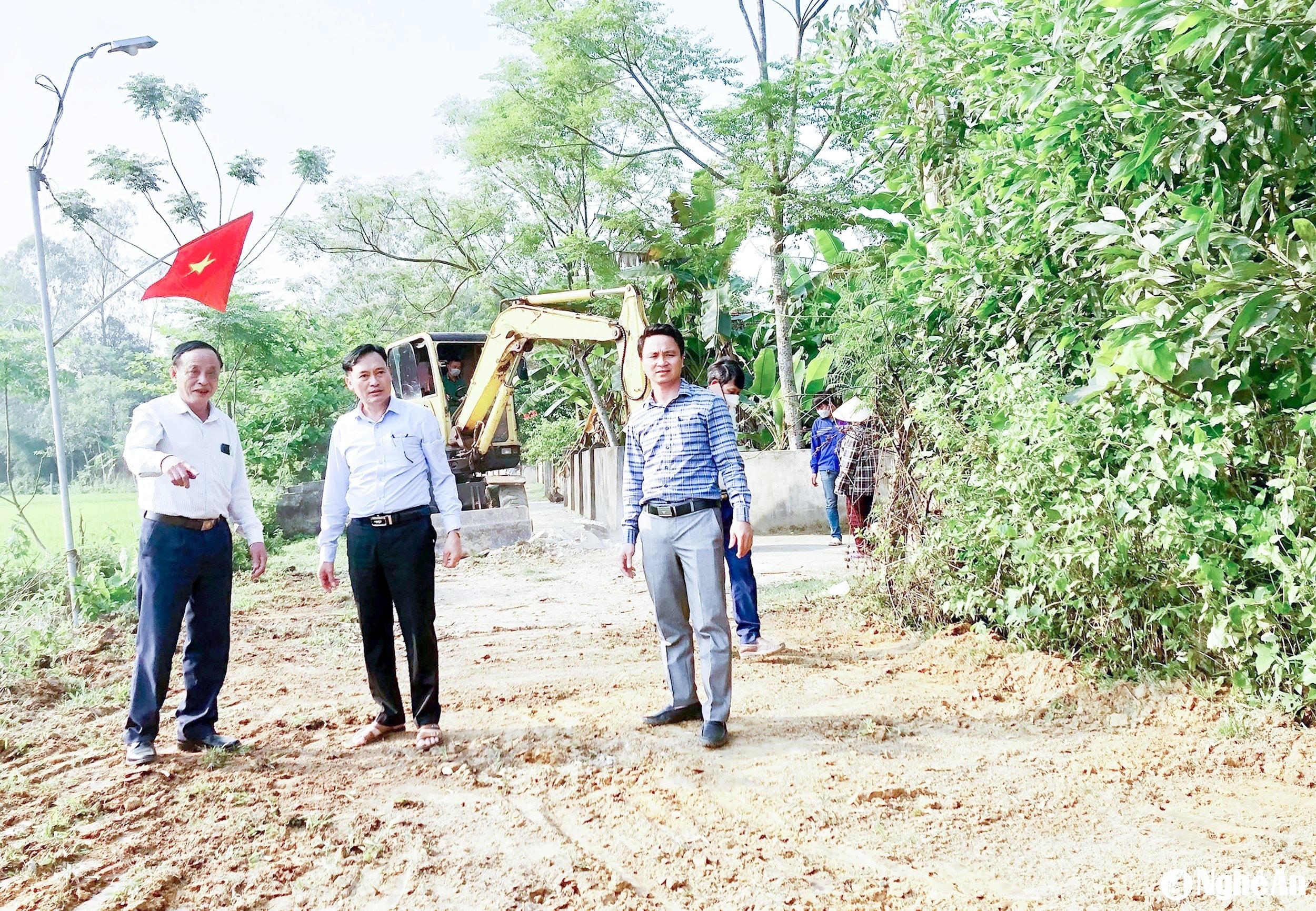Will increase central and provincial level cadres to communes
Increase the number of cadres, civil servants and public employees at the central and provincial levels going on business trips to the grassroots (expected 2 cadres/commune) to increase human resources and create momentum for local socio-economic development.

On December 31, the Government issued Decree No. 178/2024/ND-CP on policies for cadres, civil servants, public employees, and armed forces in the process of restructuring the political system's apparatus with 8 major policy groups.
Strengthening cadres and civil servants at central and provincial levels to grassroots levels
At the press conference of the Ministry of Home Affairs on the afternoon of December 31, Mr. Nguyen Quang Dung, Chief of Office of the Party Committee of the Ministry of Home Affairs, said that the purpose of issuing Decree 178/2024/ND-CP is to have good policies, ensuring the rights of cadres, civil servants, and public employees who quit their jobs due to organizational restructuring, contributing to the goal of streamlining the organizational structure, restructuring and improving the quality of cadres, civil servants, and public employees.
Retain and promote cadres with outstanding qualities and abilities.
Increase the number of cadres, civil servants and public employees at the central and provincial levels going on business trips to the grassroots (expected 2 cadres/commune) to increase human resources and create momentum for local socio-economic development.
The scope of regulation and subjects of application of the Decree are cadres, civil servants, public employees and workers in agencies, organizations and units of the Party, State, Vietnam Fatherland Front, socio-political organizations from the central to district levels; cadres and civil servants at the commune level; armed forces (including the People's Army, People's Police and cryptography) in the process of reorganizing the apparatus and administrative units at all levels of the political system,
08 major policies of Decree 178/2024/ND-CP
Policy 1:Policy for early retirees:
Accordingly, in case of being 10 years or less older than retirement age under normal working conditions and 5 years or less older than retirement age under working conditions in particularly difficult areas and having paid compulsory social insurance for retirement, they will enjoy the following 3 regimes:
One is to receive a one-time pension benefit for early retirement:
- In case of leaving within 12 months: If the remaining age is 05 years or less until retirement age, the employee will receive a subsidy equal to 01 month of current salary multiplied by the number of months of early leave; if the remaining age is from 05 years to 10 years until retirement age, the employee will receive a subsidy equal to 0.9 month of current salary multiplied by 60 months.
- In case of leave from the 13th month onwards, the benefit is equal to 0.5 of the above 12-month leave allowance.
Second, enjoy early retirement policy, including:
- Receive pension and not have pension rate deducted.
- Receive early retirement benefits, including:For those who have 2 to less than 5 years left until retirement age, they will receive a subsidy equal to 5 months of current salary for each year of early retirement; For those who have 5 to 10 years left until retirement age, they will receive a subsidy equal to 4 months of current salary for each year of early retirement.
- Receive benefits based on working time with over 20 years of compulsory social insurance payment.
In case of being less than 02 years old to the prescribed retirement age and having enough working time with compulsory social insurance payment to receive pension, he/she will be entitled to pension according to regulations and will not have his/her pension rate deducted due to early retirement.
Cadres, civil servants and public employees who retire early and are eligible for awards for their contribution but still lack the working time in a leadership position at the time of retirement will have their early retirement period calculated to correspond to the remaining time of the election term or the appointment period of the current position to be considered for awards for their contribution. For cadres, civil servants and public employees who are not eligible for awards for their contribution, the competent authority will consider forms of awards appropriate to their achievements.
Policy 2:Resignation policy for cadres and civil servants (Article 9).
Officials and civil servants who are more than 2 years from retirement age and are not eligible for early retirement policies and regimes, if they quit their jobs, will enjoy the following 4 regimes:
First, receiving severance pay: If you quit within 12 months, you will receive a benefit equal to 0.8 months of current salary multiplied by the number of months for which severance pay is calculated.
If you quit from the 13th month onwards, you will receive 0.4 months of current salary multiplied by the number of months for which you are entitled to severance pay (maximum 60 months).
Second, receive a subsidy of 1.5 months of current salary for each year of work with mandatory social insurance.
Third, the social insurance payment period is reserved or one-time social insurance is received according to the provisions of the law on social insurance.
Fourth, receive a subsidy of 3 months of current salary to find a job.
Policy 3:Resignation policy for civil servants and employees (Article 10)
Officials and employees who resign are entitled to 4 regimes like officials and civil servants who resign, the only difference is that the 4th regime is that officials and employees are entitled to unemployment benefits paid by the Unemployment Insurance Fund due to their participation in unemployment insurance.
Policy 4:Policy for cadres, civil servants, and public employees who are leaders or managers and cease to hold their positions or are elected or appointed to lower leadership or management positions (Article 11), their old position salary or leadership allowance will be retained until the end of the election term or appointment term.
Policy 5:Policy for people on business trips at the facility:
To increase the number of officials, civil servants and public employees at the central and provincial levels going on business trips to the grassroots (for a period of 3 years), the Decree stipulates 5 regimes, including:
- Continue to receive salary (including allowances) according to the job position before being sent away by the agency, organization or unit;
- Receive the first allowance equal to 10 months of basic salary at the time of taking up the job;
- In case the unit works in an area with particularly difficult socio-economic conditions, it will enjoy the policies prescribed in Decree No. 76/2019/ND-CP dated October 18, 2019 of the Government;
- After cadres, civil servants and public employees have successfully completed their tasks at the grassroots level, they will be accepted back to the agency, organization or unit where they were sent or will be assigned a suitable job by the competent authority, not lower than the job position before they were sent to strengthen their position; at the same time, their salary will be increased by one level and they will be considered for rewards by the Ministry, department, branch and province according to the provisions of the Law on Emulation and Commendation.
Policy 6:Policy to promote people with outstanding qualities and abilities, including:
- Salary increase by 1 level;
- Receive bonuses decided by the Head of the agency, organization or unit within a maximum of 50% of the bonus fund of the agency, organization or unit;
- Be given attention, priority in planning, training, fostering, and placement in leadership and management positions, including those above a certain level;
- Enjoy policies to attract and promote talented people to work in state agencies and public service units if they meet the standards and conditions prescribed in the Government's Decree.
Policy 7:Policy on training and improving the qualifications of cadres and civil servants after reorganization.
Policy 8:Policies and regimes for subjects belonging to the armed forces in the process of implementing organizational restructuring are the same as those for cadres, civil servants, public employees and contract workers in state agencies.
This Decree comes into force from January 1, 2025;
At the same time, assign the responsibility of guiding and organizing the implementation to the Ministries, branches at the Central level; Provincial People's Committees and agencies, organizations and units directly managing and using cadres, civil servants, public employees and workers in promulgating assessment criteria and conducting a comprehensive review of the quality of cadres, civil servants, public employees and workers under their management; on that basis, identify subjects who must quit their jobs due to rearrangement that are subject to this Decree in order to arrange a streamlined apparatus, reduce staff, restructure and improve the quality of cadres, civil servants and public employees, and improve the effectiveness and efficiency of operations.


